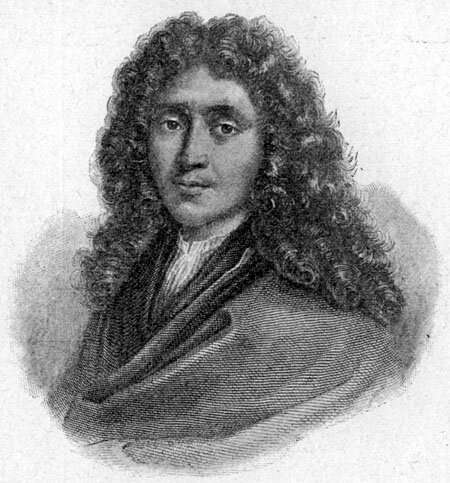"Bibliothek des allgemeinen und praktischen Wissens. Bd. 5" (1905), Französische Literaturgeschichte, Seite 22. Credit: CC0 Public Domain
Two French researchers from the CNRS and Ecole nationale des chartes have disproved the theory holding that Corneille was Molière's ghostwriter—a popular and century-old theory defended by some academics and writers. According to their forthcoming study in Science Advances, Molière is most likely the only author of his numerous masterpieces.
Was Pierre Corneille Molière's ghostwriter? The idea dates back to 1919, when French poet and writer Pierre Louÿs wrote an article attributing Amphitryon and a few other plays signed by Molière to Corneille. This suspicion grew further to encompass all of Molière's plays—how would it be possible that a poorly educated actor managing his own theatre company and valet of the king's chamber could have written so many masterpieces? Their supposed actual author, Pierre Corneille, would have benefited from Molière's fame and talent as an actor without exposing himself to controversies nor tarnishing his reputation as a serious author.
This theory was revived in the early 2000s by researchers in linguistics, noting that Corneille and Molière's styles were extremely close—which would mean that Corneille actually wrote Molière's works.
Florian Cafiero and Jean-Baptiste Camps, two researchers in computational linguistics from the CNRS and the École nationale des chartes, used "authorship attribution" techniques to disprove this theory. These rely on an extensive statistical analysis of writing habits and speech mannerism to identify the author of a text. Each individual writes using a specific proportion of words, expressions or grammatical sequences. Even when someone tries consciously to imitate another style, some elements betray authorship, like function words ( "from," "then," "of"), that we use without even thinking.
The reliability of these techniques is remarkable. They are used by historians to identify the author of medieval texts, or by an intelligence agency to understand who wrote an anonymous threat. Using these methods, the authors of this study read and analyzed the texts for three years, comparing the rhymes, grammar, vocabulary, function words and other elements in texts by Molière, Pierre Corneille, Scarron, Rotrou or Thomas Corneille. In this unprecedentedly large study, it appeared that from any point of view, the characteristics found in Molière's text were without a doubt significantly different from any other author of the time. Pierre Corneille's plays are very often the most different, Scarron's or Thomas Corneille's works being always closer to Molière's. It is thus very likely that Molière's masterpieces would not have been written by Corneille, nor by another author.
More information: F. Cafiero at Université Paris-Diderot/Université de Paris in Paris, France el al., "Why Molière most likely did write his plays," Science Advances (2019). advances.sciencemag.org/content/5/11/eaax5489
Journal information: Science Advances
Provided by CNRS























